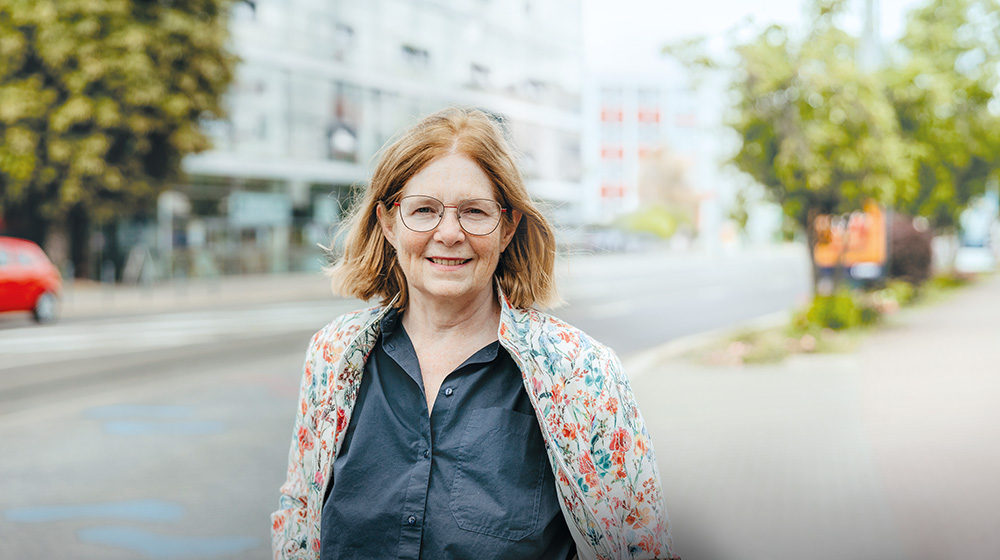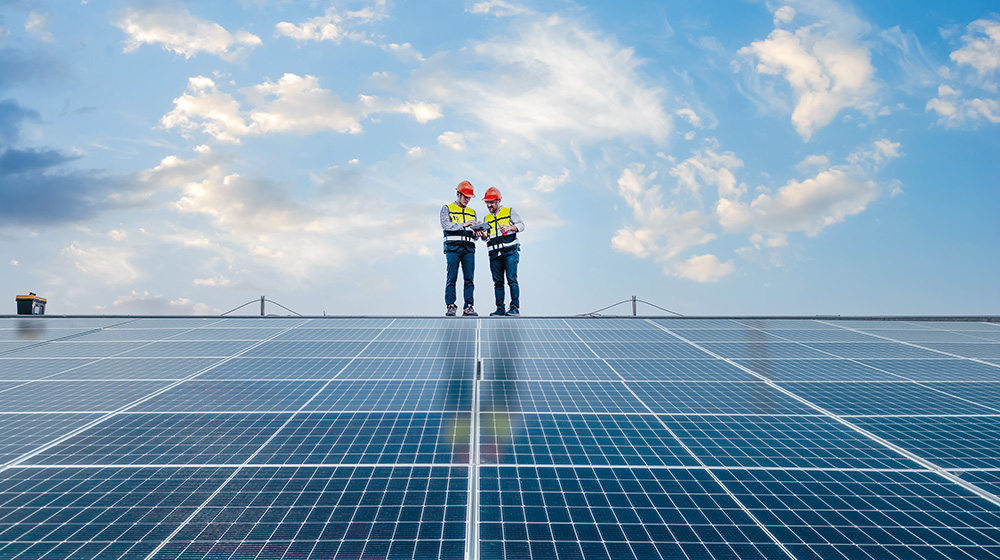
The news came in August: according to the Federal Statistical Office, in July 2022 just over 9000 more people died in Germany than in the middle of each of the years from 2018 to 2021. The main reason for this is believed to be the extraordinary summer heat with temperatures of up to 40 degrees Celsius. “In Germany we are not well prepared for dealing with longer periods of high temperatures,” says the environmental psychologist, Professor Dr. Ellen Matthies. “The death rate instantly rises by a considerable amount in heat waves.”
It wasn’t just the death rate that rose with the heat of the past summer. The high temperatures and shortage of rain also caused forests to burn, streams to dry out, crippled inland shipping in some places and resulted in large crop losses. We are seeing the effects of climate change here and now. The question that interests Ellen Matthies is how people as individuals and society as a whole can react appropriately. The researcher knows that major transformation processes are coming - including, for example, the energy transformation with a shift away from fossil fuels to renewable energies.
Acceptance rises with experience
If Germany wishes to achieve the climate goals that it has set itself and become climate-neutral by 2045, wind power and photovoltaics need to be expanded much more quickly and widely than has so far been the case. Ellen Matthies is looking at how the energy transformation can be successful in the “Energy Systems of the Future” (ESYS) project, an initiative of the three academies of sciences, acatech, Leopoldina and Akademieunion. More than 100 experts from science and research are classifying the existing energy research knowledge and preparing it for political and public debate, in order to develop possible solutions for a sustainable, secure and affordable energy supply. Ellen Matthies is the joint head of the “Accelerated development of wind power and photovoltaics” working group and is exploring, together with researchers from a variety of disciplines, the barriers that stand in the way of more rapid expansion and how they can be overcome. Recently, the resulting report was published with twelve specific action points that are intended to give the expansion greater momentum.
 Environmental psychologist Prof. Ellen Matthies researches how the energy turnaround can succeed more quickly. (Photo: Jana Dünnhaupt / Uni Magdeburg)
Environmental psychologist Prof. Ellen Matthies researches how the energy turnaround can succeed more quickly. (Photo: Jana Dünnhaupt / Uni Magdeburg)
“Fundamentally, the acceptance of renewable energies is high,” emphasizes the environmental psychologist. Around 80 per cent of the population supports the expansion of photovoltaics, while for wind power the figure stands at almost 70 per cent and for biogas between 50 and 60 per cent. However, when local residents are asked if they would support the construction of renewable energy plants in their direct environment, acceptance falls. “In psychological terms, it is particularly stressful to have the feeling of having to bear the burden while others benefit,” explains Ellen Matthies. People feel unfairly treated and exploited. The result is complaints, local initiatives mobilizing against any projects, and planning processes becoming long and drawn out. “Complaints may not be the rule, but this kind of situation should not happen at all,” explains the scientist. However, the researchers’ data also shows that where plants already exist, acceptance is much greater from local residents, with the level of acceptance from society as a whole even being exceeded. The fear of the anticipated burden - for example noise from wind turbines - is greater than the actual effects of the turbines themselves, explains Matthies.
“From the major studies that we have, there is no evidence to support something like a one-kilometer distance rule between wind turbines and residential buildings,” says Matthies. In the report, the team of experts therefore recommends permitting more areas of land to be used for expansion and making the target land area nationally of two per cent legally binding. Furthermore, in their report, the researchers state that earlier and greater public participation and a transformation in the planning and approval processes are needed to quickly expand renewables. Ellen Matthies describes the situation as follows: “Today, the stakeholders in the planning process with the greatest knowledge are usually the project developers.” Naturally, however, they have a vested interest in the projects being put into practice. Independent advisory expertise at state level that involves all important stakeholders at an early stage, holds citizens’ meetings, takes concerns seriously and can contribute towards answering questions with background technical knowledge could dispel fears, prevent complaints and accelerate the process. Furthermore, EU law provides for municipalities to have a stake in the plants and thus benefit from them directly. In places where the planning process is supported in this way, projects are rarely refused.
It is not about renunciation, but about change
“The fact that climate change is man-made has been known for over 30 years,” says Ellen Matthies. Politicians and society have reacted too slowly and too hesitantly and kicked important decisions down the road. Commenting on this hesitation, Ellen Matthies says that “Evidently many people and institutions are afraid of the transformation required. There may be a lot to lose, for example in the energy, automobile or food industry.” However, she is convinced that the social science perspective is essential for initiating the major transformations and restructuring of society in such a way that the generations to come will also be able to lead good lives within the confines of the planet.
A climate-neutral circular economy, the renunciation of fossil fuels, a changed landscape, that, for example, is based on agroforestry and also produces solar power in fields with the help of agrivoltaics, or a future with less meat - all of these are ideas for a more sustainable way of living and doing business, which inspire enthusiasm in some people, but skepticism and resentment in others. The environmental psychologist knows that it will be crucial to develop good communication strategies so that people understand the challenge and support change. The aim is not to argue confrontationally but instead purposefully, not to frighten people but to motivate them. “Transformation processes affect all individuals, and it is important to generate interest and understanding for the fact that products and services will change. It is not, primarily, about giving things up, but about being ready to engage with change and go along with it.”
 If Germany wants to be climate-neutral by 2045, wind power and photovoltaics must be expanded much more rapidly and comprehensively.(Photo: Shutterstock / APChanel)
If Germany wants to be climate-neutral by 2045, wind power and photovoltaics must be expanded much more rapidly and comprehensively.(Photo: Shutterstock / APChanel)
It is rare that people make decisions for rational reasons. Most people have gut reactions to things. How much energy do I need? How big is my CO2 footprint? What could I do to reduce it? Only a few people ask themselves these questions. Some buy themselves a bicycle so that they can reduce their car use. Some see it as a challenge to use as little energy as possible. But people like to put off making decisions - out of fear of losing something. Ellen Matthies, who as an environmental psychologist is interested in the “big questions of our time” and has “no interest in research in ivory towers”, is also exploring which advisory tools people need in order to access existing information and be able to make use of it. “I believe that wrestling for the best solution is good, dialog is good, and change is good - otherwise I wouldn't be at a university. Things have to move forward. Science can make a contribution. As a society, we have to keep moving and looking for solutions.”
In her view, politicians also have an obligation in this respect. Often, important decisions are put off out of fear of disappointing people. “Politicians cannot afford to be afraid,” she insists. “They need to look rationally at the best path and bring it to the table.” Communicating disagreeable decisions to the voters is, after all, one of the jobs of politicians. This is the only way that the people can go along with and help shape transformation. “People decide to make a contribution when they know that their actions are having a collective impact and making an important difference.”
Guericke facts
- Did you know that the amount of solar energy that reaches the earth’s surface every year exceeds the global energy demand by 7.5 times?
- In 2021, the proportion of renewable energy in the German electricity sector was 41 per cent.
- The first cars were electric. They were produced as long ago as the mid-19th century and were replaced by vehicles with combustion engines from 1910.
